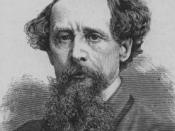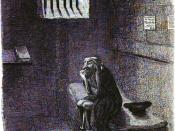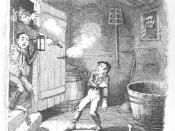Examine Dickens' development of the theme of money.
Money is a central theme in Dickens' novels. He strove to recreate with precision the world around him and its issues, and so it is fitting that money occupies such a conspicuous place at the heart of his body of work. As he ages and his work matures, Dickens' view and treatment of money changes and complicates in parallel, whether it is his central theme or not.
In Oliver Twist, money is represented as a crude panacea for all ills, as Snagsby views the half-crown in Jo's case in Bleak House. Oliver Twist is a fable of money and how (and how not) to get it. Oliver's life follows an archetypal rags-to-riches arc as simplistic as it is traditional, with his eventual wealth un-earned but well deserved. It is the goal which all characters in the novel pursue, and the fulcrum on which the plot rests.
The money itself is represented as a destination: there are no attachments to it, or furtherings from it. Unlike later novels, money exists without social connections or connotations, in a void of consequence beyond itself. Money is not of itself imbued with any specific character or associations: the ills that arise from it are owing to the nature of the people seeking it, and the means in which they do so. It is not money that makes Fagin criminal, it is Fagin's self that does.
None of the money in Oliver Twist is 'sourced' as it were: Brownlow's wealth exists in a vacuum of class, work, or moral consequence. This even applies to the crucial sum of the book: Oliver's inheritance. though its origins are known, they are not critical to the plot of the novel, crammed amateurishly as they are into one chapter of the...



Very well written!
This is a very well constructed essay; the research and effort are obvious. It fully explores the given topic, and experly relates the sources to the subject. One suggestion: any and all quotes should probably be APA in-text citationally cited, just to CYA in an English class!
1 out of 1 people found this comment useful.